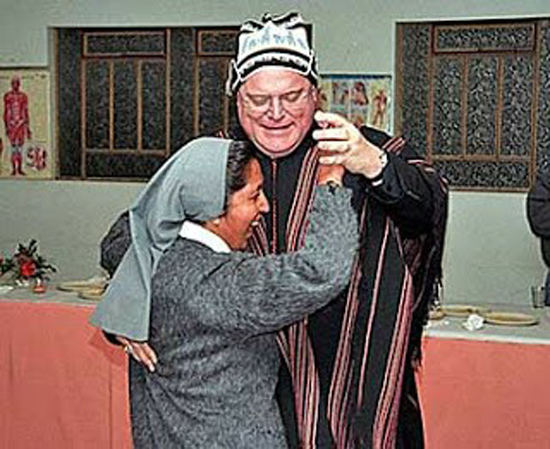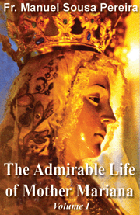What People Are Commenting
Carols, New Year & Divorce
Protestant vs. Catholic Christmas Songs
Hello TIA,
I found it ironic that about the time I read about Protestant Carols, I also had begun to question why I found Martin Luther's Away in a Manger in our church's list of Christmas songs. I wondered what else was in there that traditional Catholics should omit singing.
After doing a brief search, about all I could find was that Silent Night was written in 1818 by an Austrian assistant priest named Joseph Mohr. That being said, aside from trying to find the copyright date to a host of Christmas carols, could you provide a list of well-known songs, perhaps, that Catholics should leave off of their list of songs to be sung during both the Advent and Christmas seasons?
By the way, I really appreciate the new page dedicated to Hymns and Songs, particularly that we can listen and follow along with the music. What a treat!
Thank you for all you are doing to edify us!
E.M.S., Ph.D.
I found it ironic that about the time I read about Protestant Carols, I also had begun to question why I found Martin Luther's Away in a Manger in our church's list of Christmas songs. I wondered what else was in there that traditional Catholics should omit singing.
After doing a brief search, about all I could find was that Silent Night was written in 1818 by an Austrian assistant priest named Joseph Mohr. That being said, aside from trying to find the copyright date to a host of Christmas carols, could you provide a list of well-known songs, perhaps, that Catholics should leave off of their list of songs to be sung during both the Advent and Christmas seasons?
By the way, I really appreciate the new page dedicated to Hymns and Songs, particularly that we can listen and follow along with the music. What a treat!
Thank you for all you are doing to edify us!
E.M.S., Ph.D.
______________________
Is Marx Dancing?
TIA,
Can you tell me if this man dancing with a nun is Card. Marx without his beard? I would bet he is, but do not have other clue than the resemblance.
Thank you for the answer.
M.C.

TIA responds:
M.C.,
Unfortunately we do not have conditions to say for sure whether or not this man is Card. Reinhard Marx of Munich.
Cordially,
TIA correspondence desk
Can you tell me if this man dancing with a nun is Card. Marx without his beard? I would bet he is, but do not have other clue than the resemblance.
Thank you for the answer.
M.C.

TIA responds:
M.C.,
Unfortunately we do not have conditions to say for sure whether or not this man is Card. Reinhard Marx of Munich.
Cordially,
TIA correspondence desk
______________________
New Year’s Song
Dear TIA,
This is a very moving and beautiful video. It is lovely and well worth watching - Happy 2014!
Paysage ... exquis! Animaux ... superbe! Soliste ... excellent!
To watch click here.
L.C.
This is a very moving and beautiful video. It is lovely and well worth watching - Happy 2014!
Paysage ... exquis! Animaux ... superbe! Soliste ... excellent!
To watch click here.
L.C.
______________________
Pact of Metz
TIA,
On this first Saturday of the year, permit me to share my thoughts on 70 Years After the 3rd Secret. To a degree and to a point, the 3rd Secret was and is held hostage to the Vatican-Communist Moscow agreement that was reached, thanks to Cardinal Tisserant on behalf of the Vatican, before the first microphone was turned on to begin proceedings of V-ll in October 1962. The events that played out, decisions made and not made likewise, were oriented towards and specified by that pact, if and when push came to shove.
With the bones of St. Peter having been transferred to Portugal and the most likely authentic 3rd Secret manifested a few years ago in Portugal, there are some who wonder if a true Pope in hiding is likely to be there, too. The dogma was promised to remain in Portugal.
Our Lady of Guadalupe, Pray for Us
Our Lady of Good Success, Pray for Us
Our Lady of La Salette, Pray for Us
Our Lady of Fatima, Pray for Us
S.M.
On this first Saturday of the year, permit me to share my thoughts on 70 Years After the 3rd Secret. To a degree and to a point, the 3rd Secret was and is held hostage to the Vatican-Communist Moscow agreement that was reached, thanks to Cardinal Tisserant on behalf of the Vatican, before the first microphone was turned on to begin proceedings of V-ll in October 1962. The events that played out, decisions made and not made likewise, were oriented towards and specified by that pact, if and when push came to shove.
With the bones of St. Peter having been transferred to Portugal and the most likely authentic 3rd Secret manifested a few years ago in Portugal, there are some who wonder if a true Pope in hiding is likely to be there, too. The dogma was promised to remain in Portugal.
Our Lady of Guadalupe, Pray for Us
Our Lady of Good Success, Pray for Us
Our Lady of La Salette, Pray for Us
Our Lady of Fatima, Pray for Us
S.M.
______________________
Pelagianism
Dear TIA,
What Irony! Pope Bergoglio falsely accuses the practitioners of penance and austerity of Pelagianism - but he himself, by preaching redemption through good works without Faith - is a radical Pelagian. What a hypocrite!
P.J.
What Irony! Pope Bergoglio falsely accuses the practitioners of penance and austerity of Pelagianism - but he himself, by preaching redemption through good works without Faith - is a radical Pelagian. What a hypocrite!
P.J.
______________________
Fr. Gruner & Ecumenism
TIA,
Is Fr. Gruner and the Fatima Center becoming more ecumenical?
The Fatima Center supported Pope Francis' ecumenical world day of prayer for peace in Syria. Everyone, including non-Christians. was invited to pray in his own way for peace. When we called the Fatima Center for clarification, we were told that ecumenical prayer was fine as long as the Catholic participants prayed separately from people of other faiths.
More recently, the Fatima Center sent us an "E Newsletter" for December 2013, which put Pope Francis' phrase "ecumenism of blood" in a positive light. When we followed the link in the email, we found that "ecumenism of blood" was the Pope's promotion of a common martyrology.
We're hoping for your perspective on this.
Wishing you a happy and blessed new year.
T.C.
TIA responds:
T.C.,
Thank you for your kind wishes. We also hope you and yours will have a blessed new year.
Regarding the so-called common martyrolgy, which supposedly should include Catholics along with heretics and schismatics, TIA follows the same position of author Atila Guimarães in his book Quo Vadis Petre? published in 1999. That is to say, we are against the common martyrology, because we do not think that heretics and schismatics can earn Heaven when they die for their false beliefs.
We stand with the perennial teaching of the Catholic Church perfectly expressed by Pope Eugene IV in his Bull Cantate Domino (here).
The expression “ecumenism of blood” referring to the recent indiscriminate killing of Catholics along with heretics and schismatics by Muslims in Egypt is another inconsistent piece of propaganda of Progressivism to foster its common martyrology. Actually, if being persecuted by the same oppressor were to annul the differences of people’s faiths and put them in Heaven, all those persecuted by Nazism - Catholics, Jews, Gypsies, Communists, homosexuals etc - should also be considered part of the “ecumenism of blood” and be venerated as martyrs in Heaven, which would be a complete absurdity.
We are sad to be informed of your observations that Fr. Gruner is supposedly changing his heroic position of resisting Progressivism in order to fit into the Conciliar Church. Let us pray that this will not happen.
Cordially,
TIA correspondence desk
Is Fr. Gruner and the Fatima Center becoming more ecumenical?
The Fatima Center supported Pope Francis' ecumenical world day of prayer for peace in Syria. Everyone, including non-Christians. was invited to pray in his own way for peace. When we called the Fatima Center for clarification, we were told that ecumenical prayer was fine as long as the Catholic participants prayed separately from people of other faiths.
More recently, the Fatima Center sent us an "E Newsletter" for December 2013, which put Pope Francis' phrase "ecumenism of blood" in a positive light. When we followed the link in the email, we found that "ecumenism of blood" was the Pope's promotion of a common martyrology.
We're hoping for your perspective on this.
Wishing you a happy and blessed new year.
T.C.
______________________
TIA responds:
T.C.,
Thank you for your kind wishes. We also hope you and yours will have a blessed new year.
Regarding the so-called common martyrolgy, which supposedly should include Catholics along with heretics and schismatics, TIA follows the same position of author Atila Guimarães in his book Quo Vadis Petre? published in 1999. That is to say, we are against the common martyrology, because we do not think that heretics and schismatics can earn Heaven when they die for their false beliefs.
We stand with the perennial teaching of the Catholic Church perfectly expressed by Pope Eugene IV in his Bull Cantate Domino (here).
The expression “ecumenism of blood” referring to the recent indiscriminate killing of Catholics along with heretics and schismatics by Muslims in Egypt is another inconsistent piece of propaganda of Progressivism to foster its common martyrology. Actually, if being persecuted by the same oppressor were to annul the differences of people’s faiths and put them in Heaven, all those persecuted by Nazism - Catholics, Jews, Gypsies, Communists, homosexuals etc - should also be considered part of the “ecumenism of blood” and be venerated as martyrs in Heaven, which would be a complete absurdity.
We are sad to be informed of your observations that Fr. Gruner is supposedly changing his heroic position of resisting Progressivism in order to fit into the Conciliar Church. Let us pray that this will not happen.
Cordially,
TIA correspondence desk
______________________
Clarification on Purgatory
Greetings TIA,
I read the excellent article on Purgatory by Dr. Remi Amelunxen this December. However a point is not clear. I would appreciate it if you would kindly explain.
• Council of Trent Session 6 (1547) - canon 30 affirms – “If anyone says that after receiving the grace of justification [sacrament of penance], the guilt is fully remitted and the debt of eternal punishment is so blotted out to every repentant sinner that no debt of temporal punishment remains to be discharged, either in this world or in purgatory, before the gates of heaven can be opened, let him be anathema.”
Do I understand that, even after the Sacrament of Penance, a temporal punishment in purgatory is still due for all our sins in this life?
Thank you.
Dr. Neil Rangel, India
TIA responds:
Greetings Dr. Rangel,
Yes, we believe you understood well. When the penance prescribed by the priest is not proportionate to the guilt of the sin, a debt of punishment remains to be paid either through other sufferings on this earth or in Purgatory after death.
As Dr. Remi Amelunxen explained in other articles (here and here), there are also other means to be acquitted from this debt: by earning indulgences and practicing works of mercy.
Through partial or plenary indulgences, one can diminish or be entirely free from the debt of punishment.
Also, through works of mercy and giving alms a person may be acquitted of his debt. When he has mercy on others, he invites God to have mercy on him and partially or totally forgive that debt.
Cordially,
TIA correspondence desk
I read the excellent article on Purgatory by Dr. Remi Amelunxen this December. However a point is not clear. I would appreciate it if you would kindly explain.
• Council of Trent Session 6 (1547) - canon 30 affirms – “If anyone says that after receiving the grace of justification [sacrament of penance], the guilt is fully remitted and the debt of eternal punishment is so blotted out to every repentant sinner that no debt of temporal punishment remains to be discharged, either in this world or in purgatory, before the gates of heaven can be opened, let him be anathema.”
Do I understand that, even after the Sacrament of Penance, a temporal punishment in purgatory is still due for all our sins in this life?
Thank you.
Dr. Neil Rangel, India
______________________
TIA responds:
Greetings Dr. Rangel,
Yes, we believe you understood well. When the penance prescribed by the priest is not proportionate to the guilt of the sin, a debt of punishment remains to be paid either through other sufferings on this earth or in Purgatory after death.
As Dr. Remi Amelunxen explained in other articles (here and here), there are also other means to be acquitted from this debt: by earning indulgences and practicing works of mercy.
Through partial or plenary indulgences, one can diminish or be entirely free from the debt of punishment.
Also, through works of mercy and giving alms a person may be acquitted of his debt. When he has mercy on others, he invites God to have mercy on him and partially or totally forgive that debt.
Cordially,
TIA correspondence desk
______________________
Causes of Divorce in the Modern West
Dear TIA,
Recently, I have been trying to figure out how divorce has become so fully accepted in the Modern West. While I have been able to come up with a few scattered facts (e.g. the influence of Hollywood and the entertainment industry in general in promoting it), I still really haven’t been able to put together what the relevant root causes are.
Could you perhaps recommend some relevant links and/or resources that could assist me in this regard?
Thanking you in advance,
B.T.
TIA responds:
Dear B.T.,
We suggest you should link the avalanche of divorces in the modern West to the liberalism of its religious leaders, principally those of the Catholic Church after Vatican II. Were they more consistent regarding Catholic Morals and less concessive to modern customs, divorce would be much less pervasive, and, consequently, the modern family would be much less harmed.
We believe that you are correct in giving an important place to Hollywood in the modern corruption of customs. You should add the constant support for divorce by Protestantism since its foundation. But we think that these two factors would not have had such a broad and destructive influence if the Catholic leaders had remained firm in the Catholic traditional position of not admitting divorce. Today, we see how easy is to request an “annulment,” which is a divorce in everything except the name.
Cordially,
TIA correspondence desk
Recently, I have been trying to figure out how divorce has become so fully accepted in the Modern West. While I have been able to come up with a few scattered facts (e.g. the influence of Hollywood and the entertainment industry in general in promoting it), I still really haven’t been able to put together what the relevant root causes are.
Could you perhaps recommend some relevant links and/or resources that could assist me in this regard?
Thanking you in advance,
B.T.
______________________
TIA responds:
Dear B.T.,
We suggest you should link the avalanche of divorces in the modern West to the liberalism of its religious leaders, principally those of the Catholic Church after Vatican II. Were they more consistent regarding Catholic Morals and less concessive to modern customs, divorce would be much less pervasive, and, consequently, the modern family would be much less harmed.
We believe that you are correct in giving an important place to Hollywood in the modern corruption of customs. You should add the constant support for divorce by Protestantism since its foundation. But we think that these two factors would not have had such a broad and destructive influence if the Catholic leaders had remained firm in the Catholic traditional position of not admitting divorce. Today, we see how easy is to request an “annulment,” which is a divorce in everything except the name.
Cordially,
TIA correspondence desk

Posted January 7, 2014
______________________
The opinions expressed in this section - What People Are Commenting - do not necessarily express those of TIA
______________________
______________________

















I am a daily reader of your site.
I thought your readers would like this quote by St. Bernard: "A priest is a watchdog, and a watchdog is worthless if it does not bark."
Today, we are facing dangers of heresy and apostasy in the Church and the priests are not barking to warn the faithful of the dangers because of the compromises made with Rome.
Viva Cristo Rey,
M.F.H.